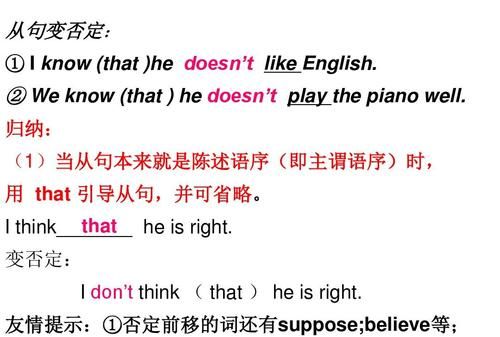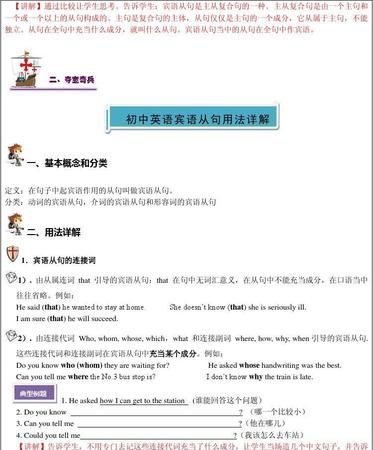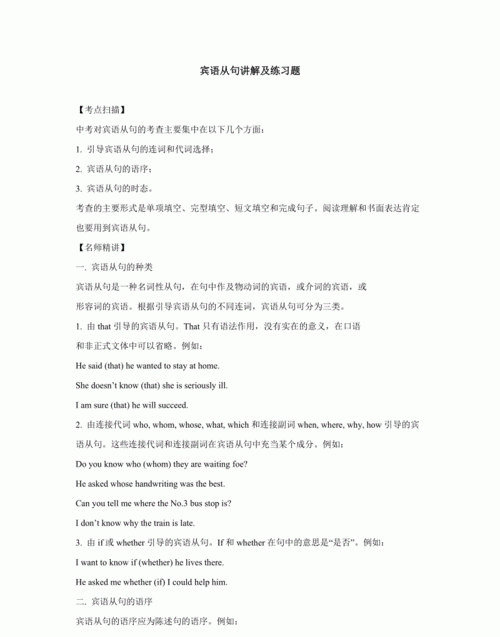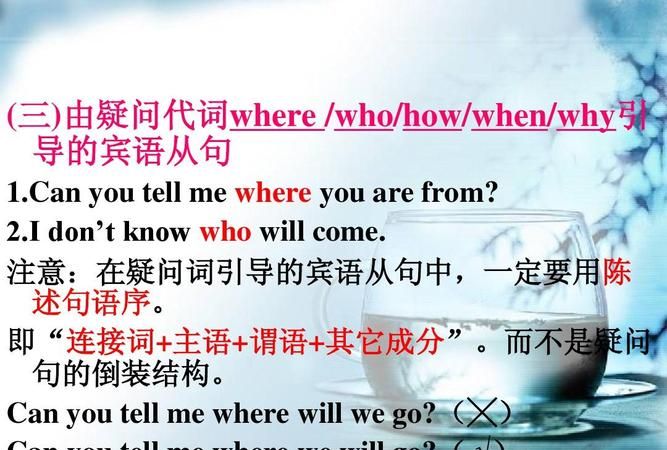本文目录
哪些词引导宾语从句
宾语从句
一
定义
:在复合句中起宾语作用的从句叫做宾语从句.
二
种类
:
1
由that引导的宾语从句---当从句是陈述句时,用that引导宾语从句.在口语和非正式文体中,that可以省略
I
know
(
that
)
you
like
English
.
2
由whether
/
if
引导的宾语从句---当从句是一般疑问句,选择疑问句或反意疑问句时,用whether
/
if引导宾语从句,并且要把疑问的语序变为陈述的语序.一般情况下,whether
/
if可以替换.但下面四种情况,只能用whether引导宾语从句.
He
asked
me
whether
/
if
I
liked
my
job
.
(A)当句子中出现
or
not
时,必须用whether引导宾语从句
I
want
to
know
whether
you
like
me
or
not
.
(B)当主句的谓语动词是由”动词+介词”构成的短语时,必须用whether引导宾语从句
They're
talking
about
whether
they'll
go
there.
(C)当宾语从句为了起强调作用,放在句首时,必须用whether引导宾语从句
Whether
you
like
me
,
I
want
to
know
.
(D)当
if
容易引起歧义时,必须用whether引导宾语从句
Please
let
me
know
if
youlike
it
.
(宾语从句
,
if
=”是否”)
Please
let
me
know
if
you
like
it
.
(条件状语从句,
if
=
”如果”)
3
由特殊疑问词引导的宾语从句---当从句是特殊疑问句时,要用特殊疑问词引导宾语从句,并且要把疑问的语序变为陈述的语序.
He
asked
them
why
they
hadn't
finished
their
homework
.
4
由形容词引导的宾语从句---
当主句的谓语动词是由”be+形容词”构成的系表结构做谓语时,用形容词引导宾语从句
I
am
sorry
(
that
)I
am
late
.

宾语从句
在句子中起宾语作用的从句叫做宾语从句。宾语从句分为三类:动词的宾语从句,介词的宾语从句和形容词的宾语从句。
宾语从句用法
时态:
1.主句用一般现在时,从句可用任意时态。
2.主句用过去时,从句用过去某个时态。
3.主句用过去时,从句是客观真理时,只用一般现在时。
一、宾语从句的连接词
从属连词
连接宾语从句的从属连词主要有that,if,whether.
that引导表示陈述句的宾语从句,
if和whether引导表示“是否”的一般疑问句的宾语从句.
He told me (that he would) go to the college the next year
他告诉我他明年上大学.
I don’t know if there will be a bus any more.
我不知道是否还会有公交车.
Nobody knew whether he could pass the exam.
没人知道他是否会通过考试.
连接代词
连接代词主要有who, whom ,whose ,what ,whoever ,whomever ,whosever, whatever, whichever等.
连接代词一般指疑问,但what, whatever除了指疑问外,也可以指陈述.
Do you know who has won Red Alert game?
你知道是谁赢得了红色警报的游戏?
The book will show you what the best CEOs should know.
这本书会告诉你最好的执行总裁该了解些什么.
Have you determined whichever you should buy,a Motorola or Nokia cell phone?
你决定好是买诺基亚还是摩托罗拉的电话了吗?
连接副词
连接副词主要有when,where,why,how,whenever,wherever,however等.
He didn’t tell me when we should meet again.
他没有告诉我什么时候我们能再见面.
Could you please tell me how you use the new panel?
你能告诉我怎么用这个新的操作盘吗?
None of us knows where these new parts can be bought.
没有人知道这些的新的零件能在哪里买到.
二、动词的宾语从句
大多数动词都可以带宾语从句
We all expect that they will win , for members of their team are stronger.
我们都预料他们会赢,因为他们的队员更强壮.
He told us that they would help us through the whole work.
他告诉我们在整个工作中,他们都会帮忙的.
部分“动词+副词”结构也可以带宾语从句
I have found out that all the tickets for the concert have been sold out.
我发现这场音乐会的所有票都卖光了.
Can you work out how much we will spend during the trip?
你能计算出这次旅行我们将花费多少钱吗?
动词短语也可以带宾语从句
常见的这些词有:
make sure确保 make up one’s mind下决心 keep in mind牢记
Make sure that there are no mistakes in your papers before you turn them in.
在上交试卷前确保没有任何错误.
可运用形式宾语it代替的宾语从句
①动词find,feel,consider,make,believe等后面有宾语补足语的时候,则需要用it做形式宾语而将that宾语从句后置.
I think it necessary that we take plenty of hot water every day .
我认为每天多喝开水是有必要的.
I feel it a pity that I haven’t been to the get-together.
我没去聚会,感觉非常遗憾.
I have made it a rule that I keep diaries.
我每天写日记成了习惯.
We all find it important that we (should) make a quick decision about this matter.
我们都认为对这件事马上做出决定很重要.
②有些动词带宾语从句时需要在宾语与从句前加it
这类动词主要有:hate, take , owe, have, see to.
I hate it when they with their mouths full of food.
我讨厌他们满嘴食物时说话.
He will have it that our plan is really practical.
他会认为我们的计划确实可行.
We take it that you will agree with us.
我们认为你会同意我们的.
When you start the engine, you must see to it that car is in neutral.
开启发动机时, 一定要使汽车的离合器处于空挡位置.
③若宾语从句是wh-类,则不可用it代替
We all consider what you said to be unbelievable.
我们都认为你所说的是不可信的.
We discovered what we had learned to be valuable.
我们发现我们所学到的东西都是有用的.
三、介词的宾语从句
用wh-类的介词宾语从句
We are talking about whether we admit students into our club.
我们正在讨论是否让学生加入我们的俱乐部.
The new book is about how Shenzhou 6 manned spaceship was sent up into space.
这本新书是关于神州6号载人航天飞船是如何升入太空的.
用that,if引导的介词宾语从句
有时候except,but,besides三个介词后可见到that引导的宾语从句
I know nothing about my new neighbor except that he used to work with a company.
对于我的新邻居我只知道他曾在一家公司上班,其他一无所知.
四、形容词的宾语从句
常用来引导宾语从句的形容词有: sure,certain,glad,please,happy,sorry,afraid,satisfied,surprised
I am sure I will pass the exam.
我确信我会通过考试.
I am sorry that I have troubled you so long.
很抱歉我这么长时间在打扰你.
He is glad that Li Ming went to see him when he was ill.
他很高兴在他生病的时候李明能去看望他.
五、if,whether在宾语从句中的区别
① if和whether在作“是否”解时,引导宾语从句常放在动词know,ask,care,wonder,find out等之后,介词后一般不用if
② 少数动词,如:leave,put,discuss,doubt后的宾语从句常用whether.
③ whether后可以加or not,但是if不可以.
④ 在不定式前只能用whether.
(如:I can’t decide whether to stay. 我不能决定是否留下。)
⑤ 避免歧异时,我们常用whether而不用if.
六、哪些宾语从句不可以省略引导词that
当that作learn,suggest,explain,agree,wonder,prove,mean,state,feel,hold等动词的宾语时;
当宾语从句较长时;
当主语状语置于主句尾,宾语从句之前时;
当主语谓语动词(包括非谓语动词)与宾语从句之间有插入语时;
当一个动词带有两个或两个以上宾语从句时,此时第一个that可以省略,第二个that不可以省略;
当宾语从句中的主语是this,that或this,that做主语的定语时;
当宾语从句是双宾语中的直接宾语时;
当宾语从句的主语是非谓语动词或主语从句时;
当主语中的谓语动词是固定词组时;
当宾语从句有it做其先行词时;
在直接引语中,转述分句把宾语从句隔开时.

宾语从句是什么
在复合句中用作宾语的从句叫宾语从句。
1.语序
无论主句是陈述句还是疑问句,宾语从句都必须使用陈述语序,即“主句+连词+宾语从句(主语+谓语+……)”句式。根据连接词在从句中所担任的不同成分,可分为以下四种:
1)连接词+谓语。连接词在从句中作主语。常见的连接词有: who,what,which等。如:
Could you tell me who knows the answer,please?你能告诉我谁知道答案吗?
The small children don't know what is in their stockings.这些小孩子不知道袜子里有什么东西?
2)连接词+名词+谓语。连接词在从句中作主语的定语。常见的连接词有:whose,what,which,how many,how much等。如:
He asked whose handwriting was the best in our class.他问我们班上谁的书法最好。
The teacher asked us how many people there were in the room.老师问我们房间里有多少人。
3)连接词+主语+谓语。连接词在从句中作宾语、状语或表语。常见的连接词有:who(m),what,which,how many,how much, when,why,how,where,if /whether(在句中不充当任何成分)等。如:
He hasn't decided if he'll go on a trip to Wuxi.他还没决定是否去无锡旅行。
Could you tell me what I should do with the money ?你能告诉我我如何处理这笔钱吗?
4)连接词+名词+主语+谓语。连接词在从句中作宾语或表语的定语。常见的连接词有:what,which,how many,how much,how等。如:
Do you know which class he is in ?你知道他在哪个班吗?
She asked me if I knew whose pen it was.她问我是否知道这是谁的钢笔。
2.连接词
1)当由陈述句充当宾语从句时,用that引导,that无词义,在口语或非正式文体中常省略。如:
He said that he could finish his work before supper.他说他会在晚饭前完成工作。
2)当由一般疑问句充当宾语从句时,用if或whether引导,意为“是否”。如:
I don't know if /whether he still lives here after so many years.我不知道这么多年后他是否还住在这儿。
但在下列情况下只能用whether:
①在具有选择意义,又有or或or not时,尤其是直接与or not连用时,往往用whether(if…or not也可以使用)。如:
Let me know whether /if he will come or not.(=Let me know whether or not he will come)让我知道他是否能来。
I don't know whether /if he does any washing or not.(=I don't know whether or not he does any washing.)我不知道他洗不洗衣服。
I wonder whether we stay or whether wego.我不知道我们是去还是留。
②在介词之后用whether。如:
I'm interested in whether he likes English.我关心的是他是否喜欢英语。
We're thinking about whether we can finish the work on time.我们正在考虑是否能按时完成这项工作。
I worry about whether I hurt her feelings.我担心是否伤了她的感情。
③在不定式前用whether。如:
He hasn't decided whether to visit the old man.他尚未决定是否拜访那位老人。
I don't know whether to go.我不知去否。
He hasn't decided whether to go by bus or by train.他还未决定是乘公共汽车去还是坐火车去。
④whether置于句首时,不能换用if。如:
Whether this is true or not,I can't say.这是否真的我说不上来。
⑤引导主语从句和表语从句时宜用whether。如:
Whether she will come or not is still a question.她是否能来还是个问题。
The question is whether we can catch the bus.问题是我们能否赶上公共汽车。
⑥若用if会引起歧义时,则用whether。如:
Please let me know if you like the book.可理解为:
a.Please let me know whether you like the book.请告诉我你是否喜欢这本书。
b.If you like the book,please let me know.你如果喜欢这本书,请告诉我。
3)如果宾语从句原来是特殊疑问句,只需用原来的特殊疑问词引导。如:
Could you tell me why you were late for the meeting this morning?你能告诉我今天早上你为什么开会迟到吗?
3.时态
含宾语从句的复合句,主、从句谓语动词的时态呼应应包括以下三点内容:
1)如果主句的谓语动词是一般现在时,从句的谓语动词可根据需要,选用相应的任何时态。如:
I don't know when he will come back.我不知道他将何时回来。
He tells me that his sister came back yesterday.他告诉我他姐姐昨天回来了。
2)如果主句的谓语动词是过去时,宾语从句的谓语动词只可根据需要,选用过去时态即一般过去时、过去进行时、过去将来时或过去完成时的某一种形式。如:
①The children didn't know who he was.孩子们不知道他是谁。
②He asked his father how it happened.他问他父亲这件事是如何发生的。
3)如果宾语从句所表示的是客观事实、普遍真理、自然现象或习惯性动作等,不管主句用什么时态,从句时态都用一般现在时。如:
The teacher said that the earth goes round the sun.老师说地球绕着太阳转。
4.注意:
if和when既可以引导宾语从句,也可以引导状语从句,应注意它们在两种从句中的意思和用法的不同。if和when引导宾语从句时,分别意为“是否”和“何时”,其时态应和主句时态相呼应;它们引导状语从句时,意思分别为“如果,假如”和“当……时候”,当主句时态是一般将来时时,其时态用一般现在时。它们常常放在含有状语从句和宾语从句的题干中进行综合考查。如:
—Do you know when he will come back tomorrow ?你知道他明天什么时候回来吗?
—Sorry,I don't know.When he comes back,I'll tell you.对不起,不知道。当他回来了,我将告诉你。
—I don't know if he will come.我不知道他是否会来。
—He will come if it doesn't rain.如果不下雨,他会来的。
简化宾语从句常用六法
同学们常会遇到把含有宾语从句的复合句转化为简单句,使其与原句意思相同(或相近)的试题。下面就介绍几种常用的简化宾语从句的方法:
方法一:当主句谓语动词是hope, decide, wish, choose, agree, promise等,且宾语从句的主语与主句主语一致时,宾语从句可简化为不定式结构。例如:
Li Ming hopes he will be back very soon. →Li Ming hopes to be back very soon.
We decided that we would help him. →We decided to help him.
方法二:当主句谓语动词是know, learn, remember, forget, tell等动词,且主句主语与从句主语一致时,宾语从句可简化为“疑问词+不定式”结构。例如:
She has forgotten how she can open the window. →She has forgotten how to open the window.
注:当主句谓语动词是tell, ask, show, teach等动词,且后带双宾语,从句主语和间接宾语一致时,宾语从句可简化为“疑问词+不定式”结构。例如:
Could you tell me how I can get to the station? →Could you tell me how to get to the station?
方法三:当主句的谓语动词是order(命令),require(需要)等时,如果主句和从句的主语不一致,宾语从句可简化为“名词(代词)+不定式”结构。例如:
The headmaster ordered that we should start at once. → The headmaster ordered us to start at once.
方法四:某些动词后的宾语从句,可以用介词加动名词(短语)等其他形式简化。例如:
He insisted that he should go with us. →He insisted on going with us.
The poor boy doesn’t know when and where he was born. →The poor boy doesn’t know the time and the place of his birth.
方法五:某些动词后面的宾语从句可转化为“宾语+V-ing形式(作宾语补足语)”结构。例如:
Liu Ping found that there was a wallet lying on the ground. → Liu Ping found a wallet lying on the ground.
方法六:动词seem后的宾语从句,也可以用不定式(短语)来简化,但句型需要进行适当的变化。例如:
It seemed that the boys were going to win. →The boys seemed to win.
除上述方法外,还有一些特殊句式的转化。例如:
I found that it was difficult to learn English well. →I found it difficult to learn English well.
Soon we found that the ground was covered with thick snow. →Soon we found the ground covered with thick snow.
They found that the box was very heavy. →They found the box very heavy
(这个是在网上帮你找的,希望对你有帮助.总之,宾语从句是在一个主从复合句中当宾语的一个从句,如果是初中阶段的话,重点要注意主从句之间的时态,还有从句部分的语序问题)

不同时态的宾语从句例句
宾语从句有三大要素:
连接词,语序,时态
时态要求:
主句是过去的时态,从句要用相应的过去时态(过去时,过去将来,过去完成等)注意:从句是客观真理,自然现象,用一般现在时。
主句不是过去时态,从句根据句子自身要求可以用各种时态。
注意:主句中Could/ Would you...,它们不是过去式,是委婉的请求。

以上就是关于写出三个不同的宾语从句 ,哪些词引导宾语从句的全部内容,以及写出三个不同的宾语从句 的相关内容,希望能够帮到您。
